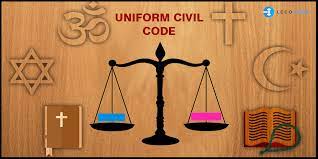
Uniform Civil Code

Uniform Civil Code came to light when BJP MP Kirodi Lal Meena introduced a
private member bill to set up a panel for the preparation of the uniform civil code, during the
zero hours of the Rajya Sabha. His bill was concerned with the setting up of a National
Inspection and Investigation Committee, which will be concerned with the preparation and
implementation of the Uniform Civil Code throughout the country. Members of the
opposition parties like Congress, Communist Party of India, Communist Party of India (M),
and Trinamool Congress protested stating that it will destroy the nation’s social fabric and
commitment to diversity and harmony. But when a division vote was called upon, the
government supported the private member bill, and it got 63 votes in favor.
When recently, questions regarding the passage of the bill were posed to law minister Kiran
Rijiju. He clarified that the situation had not yet been resolved and that the government had
asked the 21st Law Commission to examine the relevant issues and offer recommendations,
but the term of the 21st law commission has ended so the matter will be taken up by the 22nd
law commission.
Uniform Civil Code was in the manifesto of the BJP in the 2019 Lok Sabha elections, and
since then it has tried to implement in it its BJP-ruled states like Uttarakhand, Gujarat, and
Madhya Pradesh. A committee to look after the roadmap for implementation has already been
formed in Gujarat and Madhya Pradesh. The Uttarakhand government also formed an expert
committee headed by the former supreme court judge Ranjana Desai for the examination and
implementation of the Uniform Civil Code. Karnataka Chief Minister also announced that the
government is also considering the implementation of the Uniform Civil Code. Assam Chief
Minister also in a rally announced in the favour of the Uniform Civil Code.
Many Public Interest Litigations were filed against the Uttarakhand and Gujarat decisions and
all of them were rejected by the Supreme court bench comprising Chief justice DY
Chandrachud and Justice PS Narasimha. The bench stated that the constitution of the
committees is valid as the states can deal with the matters related to personal laws as are given under Entry 5 of the concurrent list and the executive power of the state extend to these matters by the ambit of the Article 162 of the constitution.
Article 44 is included within the directive principles of the state policy of the Indian
constitution with aim of minimizing discrimination against the vulnerable group and
harmonizing the differences between various cultural groups.
The only state in India which has a Uniform Civil code is Goa, where all Hindu, Muslim,
Christians, Parsi, etc follow the same law related to succession, marriage, and divorce. The
Goa Daman and Diu Administration Act of 1962, which was passed after Goa joined the union
as a territory in 1961, gave the state of Goa permission to apply the Portuguese Civil Code of
1867, subject to amendment and repeal by the appropriate legislative body.








